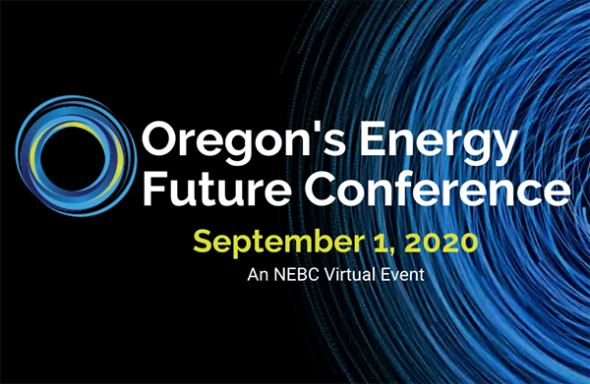Insight and Collaboration at the 2020 Oregon’s Energy Future Conference
Posted on September 4, 2020 by Charlotte Shuff
Tags, Energy, Conference & Events

As the COVID-19 pandemic continues to impact all aspects of life, the energy sector looks toward building a better future; this spirit was on full display at the Oregon’s Energy Future Conference, hosted by Northwest Environmental Business Council on September 1, 2020. CUB was a proud sponsor of this online conference, where experts from across the Pacific Northwest shared their vision for a more resilient and equitable energy sector. These discussions ranged from innovations in technology and distributed energy resources to reducing low-income energy burden and increasing energy efficiency.
The first morning panel discussed distributed energy resources and associated challenges and opportunities in this COVID-19 reality. Although working directly with customers is increasingly more difficult, renewable energy providers and utility companies are finding ways to work around in-person limitations. Despite the economic disaster, solar installations continue to grow and add clean energy to the grid. Utilities such as Portland General Electric have found innovative ways to connect customers with smart technology, such as smart thermostats and water heaters, to manage load and benefit the entire system. Distributed energy resources provide opportunities for grid resilience and economic benefit for customers and communities.
The second morning panel dove into low-income energy burden and the need for innovative policy solutions to address this pervasive issue. A new report prepared for Oregon Housing and Community Services (OHCS) shows over $345 million of energy burden for low income households in Oregon. The report considers a household or individual customer “energy burdened” if 6 percent of their income goes to paying energy bills. The OHCS report also shows that current low-income bill assistance programs are both underfunded and unable to meet roughly 80 percent of Oregonians’ needs. Solutions discussed included expanding billing assistance programs from local governments and utilities, allowing utilities to offer discounted rates for low-income households, and expanding energy efficiency and weatherization programs.
The lunchtime keynote speaker, Jaimes Valdez, representing the Portland Clean Energy Fund, continued the pivot to conversations about building equitable energy systems. By exploring the history of ratemaking through the impact on customers today, Valdez highlighted the need for strong consumer protections and innovation. Black, Indigenous, and People of Color are affected first and worst by inequitable energy systems. As Oregon responds to and rebuilds from the current economic disaster, it is our responsibility to build a more equitable future that prioritizes supporting low-income households and communities of color.
The afternoon panel on energy efficiency addressed the need for these programs to target those most affected by energy burden. Not only is energy efficiency Oregon’s least cost resource, it also adds tremendous benefits to individual customers in terms of bill savings and comfort. Many of these modifications provide real health and safety benefits, including improving air quality and reducing environmental hazards. From weatherizing and updating appliances to replacing old manufactured homes, the panelists addressed the many tools we have at our disposal to invest in energy efficiency as both a social and an environmental benefit.
The day wrapped up with a keynote panel and a broad discussion of where Oregon is headed on climate policy. This panel featured Oregon tribal leaders, climate advocates, and consultants. As directed by the Governor’s Executive Order No. 20-04 in early March, state agencies must now facilitate significant greenhouse gas reductions to meet Oregon’s overall mid-century goals. Across the board, advocates continue to gain traction in building a more just and sustainable energy future.
As we go through this time of change, it is important to work toward rebuilding better than before. This conference showcased the importance and power of state leaders, advocacy groups, and industry working together. While in many cases, the utilities still have a way to go in bolstering consumer and environmental protections, advocates for a more equitable future shone bright at this conference.
To keep up with CUB, like us on Facebook and follow us on Twitter!




09/09/20 | 0 Comments | Insight and Collaboration at the 2020 Oregon’s Energy Future Conference